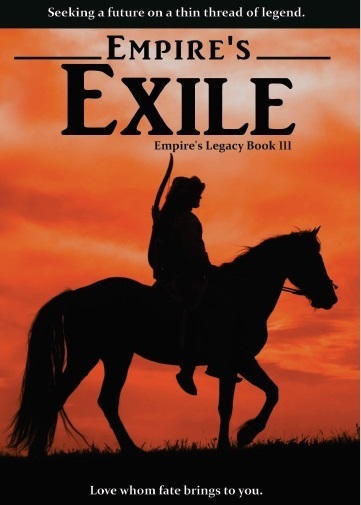Marian Thorpe
Writer of non-magical historical fantasy for mid-teens and up. The Empire's Legacy series explores gender expectations, the conflicts between personal belief and societal norms, and how personal definitions of love and loyalty change with growth and experience.
The world of Empire's Legacy was inspired by my interest in the history of Britain in the years when it was a province of the Roman Empire called Britannia, and then in the aftermath of the fall of the Roman Empire. In another life, I would have been a landscape archaeologist, and landscape is an important metaphor in the Empire's Legacy trilogy and in all my writing, fiction and non-fiction.
I live in Canada for most of the year, England for the rest, have two cats, a husband, and when I'm not writing or editing, I'm birding.
Interview:
1. Will you tell us about your most recent published work?
Empire's Exile is the third book in my Empire's Legacy trilogy. Set in a world reminiscent of northern Europe after the decline of the Roman Empire, the series follows a young fisherwoman, Lena, as she reluctantly becomes a soldier. In Exile, she and a companion, Cillian, have been exiled for violating the terms of a truce. They face physical and personal challenges to simply survive the first winter, and when circumstances force them to leave the village that took them in, they travel east, looking for the fabled, lost city of Casil. By chance, they meet travellers from their lands, also seeking Casil in hope of military support for the war raging at home. But what will the cost of that support be?
2. What personal challenges do you face as a writer?
Age is catching up with me! Hand and wrist and shoulder pain are a problem, even with using ergonomic keyboards and a large screen.
3. What is the most difficult part of your artistic process?
Now, three books and a WIP into this world and my characters' stories, it's deciding which of many directions I could go in the next installment. I have the WIP and two further books planned, under the series title Empire's Reprise, but there are many other stories I could tell.
4. What one thing would you give up to become a better writer?
What I do give up: time. I used to also be a graphic artist, but except for the occasional birthday card, I don't do much now.
5. How did publishing your first book change your process of writing?
My editors were outstanding, and taught me how to take a first draft and turn it into a polished manuscript. I use everything I learned from them in developing my stories.
6. How many unpublished and half-finished books do you have? Will you tell us about them?
Oh, heavens. Three, I think. One from when I was in high school, two others. The first was a literary novel; the second was a paranormal romance, and the last was a crime novel. The only interesting thing about them is they all dealt, one way or the other, with the themes I still write about: the conflicts between love for an individual and love for one's land.
7. Do you read your book reviews? How do you deal with bad or good ones?
I do. With bad ones I find something in it to laugh about, and good ones I react to as almost any writer does, with a sense of satisfaction that I've written something that gave someone pleasure.
8. Do you hide any secrets in your books that only a few people will find?
Not secrets exactly, but an inside joke or two, and there is always something my husband has suggested that gets included in a scene just for him. In the current WIP he wanted a football (soccer) game, so it's there.
9. What other authors are you friends with, and how do they help you become a better writer?
Many! I belong to two writers' groups in my home city, and the discussions we have, whether formally part of the program or over lunch, have been invaluable.
10. If you could tell your younger writing self anything, what would it be?
Have more confidence; write, submit, learn to deal with rejection, learn to take advice, write some more.
11. What are common traps for aspiring writers?
Listening to all the people on social media who want to tell you how to write.
12. What’s the best way to market your books?
I have an odd demographic: although my protagonist is 17 at the beginning of the trilogy and only 25 at the very end, my readers are largely over 50. My oldest is 98. Those readers – who prefer paperbacks – I reach through my local bookstore, and by word of mouth, and some print advertisement. Twitter is proving useful to find a younger audience, and my e-book sales have gone up noticeably since I began interacting there.
13. What is your favorite childhood book?
I'm not sure I can answer that. I read voraciously and indiscriminately as a child. The book – novella, I suppose – that first made me realize the power a writer has over the reader was The Dragon in the Clockbox, by M. Jean Craig. Was there ever a dragon's egg in that box?
Social Media Links
Website: https://www.marianlthorpe.com
Twitter: https://twitter.com/marianlthorpe (@marianlthorpe)
Facebook: https://www.facebook.com/marianlthorpe/
Amazon Author Page: https://authorcentral.amazon.com/gp/books




